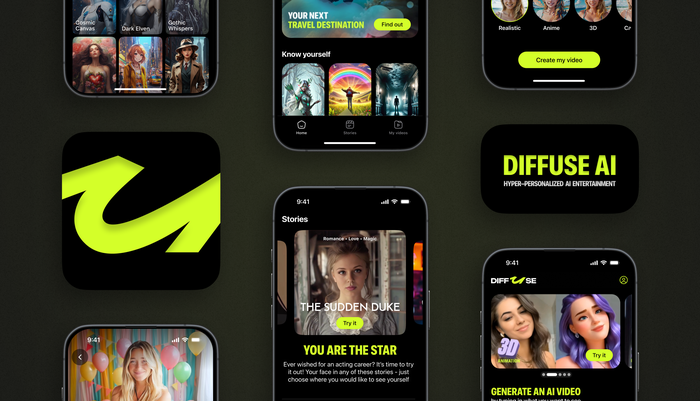New year, new AI: Three Google Cloud leaders reflect on what's next for gen AI

Matt A.V. Chaban
Senior Editor, Transform
To celebrate 2024, here's a peek of our monthly Google Cloud newsletter for tech and business leaders. Sign-up for more insights only available in your inbox.
As we kick off the new year, AI is — very much still — on everyone’s minds. That’s certainly the case here at Google, which has been an AI-first company for years after all.
It can be a lot to keep up with, especially when AI seems to be driving the pace of change even faster than before. To help our well-informed but busy audience keep pace, we relaunched Google Cloud's monthly executive newsletter last fall. Each edition rounds up our best articles, events, videos, research, and other information that business and tech leaders need to know to stay updated on cloud and AI advances at Google Cloud.
One of the favorite features in each issue is The Forecast. It presents exclusive insights from our tech and industry leadership that you can only get delivered to your inbox if you subscribe to the newsletter. Well, except for this time. To give you a feel for The Forecast, and why it’s worth adding The Google Cloud Newsletter to your email list, we wanted to bring you a peek at our December edition.
Here we talked to three of our top leaders on the progress they made in bringing AI to market in 2023 and what they expect to see in 2024. We hope you enjoy it enough to sign up in time for the next issue.


Amin Vahdat, GM and VP of Machine Learning, Systems, and Cloud AI
This past year has been transformational, as we’ve watched the next phase of the technology industry being defined in real time. The year has gone by so quickly, with tremendous impact at each turn, as we launched new generative AI solutions and expanded machine-learning services powering many Google products, including Search and Bard. This work culminated with this month’s launch of Gemini, as well as the AI Hypercomputer that includes our most powerful and scalable TPU, Cloud TPU v5p.
Not only is Gemini our most capable and most efficient model to date — it also represents the best of Google, as teams came together from across the company, in record time, to achieve breakthroughs that even a few months ago seemed years away. With all the big moments and exciting announcements in 2023, what excites me the most, in terms of what we can provide for our customers, is our ability to bring everything, from our state-of-the-art models to our in-house-designed infrastructure, together to deliver the most comprehensive AI platform.
I’m thrilled to bring this technology to developers all over the world to enable them to build AI-powered applications or to infuse AI into existing applications. Truly transformative capabilities are on the horizon with generative AI, and we are just now seeing glimpses of what these AI-enabled apps and services will unlock.


Anil Jain, Managing Director, Strategic Consumer Industries:
Looking back at 2023, it’s clear that organizations — both public and private — have awakened to the power and potential of generative AI and the transformational impact it can have in every industry sector and functional domain. What struck me as incredibly positive was how many enterprises have recognized that there are quick and easy ways to use gen AI in their businesses today, with meaningful near-term impact on both top and bottom lines.
The publisher Forbes, for example, used Vertex AI Search and Conversation to deploy a new conversational search experience on their website in a matter of weeks. Carrefour developed their own gen-AI-powered marketing studio that allows them to quickly create audience-targeted ad copy. And Deutsche Bank used Vertex AI for AI-assisted software development, accelerating developers’ productivity.
You could sum up 2023 with two words: AI experimentation. In 2024, those experiments will continue, but I expect we’ll see more organizations recognize the importance of adopting an end-to-end AI platform, versus focusing on specific models alone. It also seems inevitable that organizations will begin to establish AI governance councils and policies to ensure that they’re being responsible, safe, secure, and regulation-compliant in their use of AI.


Andi Gutmans, GM and VP of Databases:
This year, generative AI has really swung the pendulum, when it comes to exploiting AI and machine learning, from data scientists and analytics over to application developers who are looking to quickly build enterprise gen AI apps. AI is no longer just the domain of experts and researchers — rather, we're seeing large language models, or LLMs, democratize access to AI for developers.
While these LLMs have become powerful and impressive at fueling the AI boom, by themselves they fail to deliver the accurate, up-to-date, and interactive experiences that enterprises need to deliver to their users. To achieve this promise, organizations need to embrace a retrieval-augmented generation approach, more commonly known as RAG or groundings. With RAG, operational data is integrated with language models to deliver real-time, hyper-personalized, and contextually-relevant experiences, tailored to the organization’s unique needs and culture.
Simply put, gen AI-enabled operational databases, holding relevant business and customer data, will be the key to unlocking gen AI in the enterprise. Add to all this the more advanced models like Gemini, and especially Gemini Ultra, that will be available in the coming months, and it’s hard not to be excited about all the ingenuity that is going to make next year even bigger than this one.
Opening image created with Midjourney, running on Google Cloud, using the prompt: a New Years baby wearing a diaper and sash at New Years Eve using futuristic binoculars.



